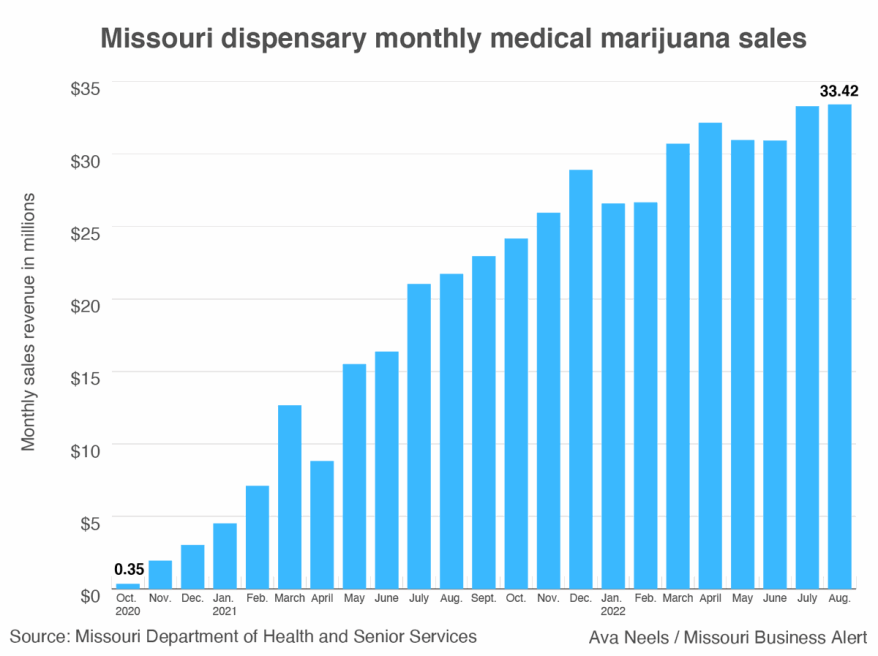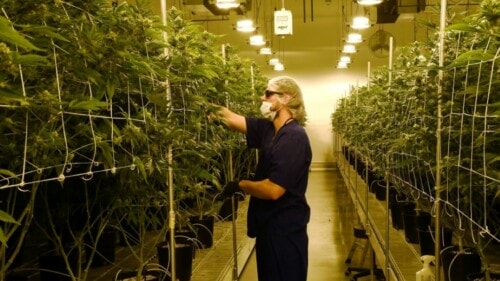Voters Could Open up Missouri’s Marijuana Market. New Entrants Would Face Challenges. On the Ballot Nov. 8
Published October 14th, 2022 at 10:16 AM
Above image credit: Marijuana in a growing facility. (Courtesy | Missouri Business Alert)Missouri’s marijuana industry could soon open wide if voters approve a proposed amendment on the November ballot.
Amendment 3 would legalize cannabis in the state for anyone 21 and older. Businesses that already have a medical marijuana license could apply to convert to a recreational license. And, 144 micro business licenses would be made available for smaller operators looking to enter the market.
If the measure passes, many existing cannabis businesses in the state will be able to rev up sales as the customer pool widens. But some in the industry are concerned that the amendment could create an uneven playing field for newcomers, especially as existing businesses get a head start.
Missouri marijuana dispensaries have brought in more than $494 million since the first stores opened in October 2020. Sales could grow to as much as $900 million annually by 2025 if the market opens up, said Chase Cookson, a professor and researcher at Saint Louis University’s Cannabis Science and Operations Program.

The cannabis industry would draw dollars to Missouri, he said. People from nearby states without fully legalized marijuana, including Kansas and Nebraska, would likely come to the state to purchase cannabis.
Even people in Illinois, which legalized recreational marijuana in 2020, would be likely to come across state lines seeking Missouri’s cheaper taxes, Cookson said. Missouri’s marijuana sales tax would be 6%, and local entities could charge an additional tax of up to 3%, according to the amendment.
Legalizing recreational marijuana would cost the state $3.1 million initially and $5.5 million per year after that, according to the Secretary of State’s office. The state expects annual revenue of at least $40 million.
There are about 350 marijuana businesses in the state with medical licenses that would have the option to convert to a recreational license. Businesses with existing licenses can request a conversion 30 days after the election if the amendment passes. It’s likely all of them would, Cookson said.
“I can’t think of a reason not to do that,” he said. “I imagine every single one of them will.”
Preparing for Growth
Businesses that already hold licenses are expecting a surge in sales. Some are already preparing for the possibility of a larger market.
One of those is BesaME Wellness, a cannabis dispensary with five locations in the Kansas City area. Joey Pintozzi, BesaME’s vice president of retail operations, expects as much as three times the number of customers if cannabis is fully legalized. The stores currently see about 500 customers per day, he said.
“We’ve had this business model for two years, and now we (would) bust out of those seams,” Pintozzi said.

The business is planning to hire more people and increase training to get ready for new customers.
For most existing dispensaries, there wouldn’t be a large shift in product, since most sell cannabis products that are typically preferred by recreational users, Cookson said.
Some customers that currently purchase marijuana illegally would begin to purchase at dispensaries. But Cookson expects a good portion of people would continue to purchase from the illegal market.
The legal, regulated industry is likely to consolidate over time if the ballot initiative is passed, Cookson said. Already, there’s been consolidation across the country. As more states legalize cannabis, consolidation will likely continue.
“That doesn’t bode well for small producers,” Cookson said.
Barriers to Business
Marne Madison spent around $70,000 to apply for a medical marijuana license in Missouri, only for her application to be denied, she said.
She ended up going to Oklahoma to open a dispensary. There, the number of licenses is unlimited and there are fewer hoops to jump through, she said. This time she invested thousands of dollars, but it was toward an end.

“I’m actually building out a business,” she said. “I’m not applying six figures and hoping to win.”
When it costs tens of thousands of dollars to even try for a license, it leaves people out, said Madison, who is the executive director of Exit Now, a nonprofit that educates and supports underrepresented founders looking to enter the industry.
“When we talk about how we can operate and be inclusive to everyone, it’s basically by saying that, no, you do not need to be a millionaire to be in this industry,” Madison said.
The 144 micro business licenses in Missouri’s proposed amendment would be distributed to operators who meet at least one of several qualifications. Those include owners who have a net value of less than $250,000, plan to operate in an area 30% below the poverty line, or have non-violent, marijuana-related convictions.
The micro licenses would be distributed in phases across the state over a span of about two years.
These micro businesses — cultivators, manufacturers and dispensaries — would only be able to work with other small marijuana operators. That stipulation was created so that new operators can break into the market without competition from existing businesses, said John Payne, campaign manager for Legal Missouri 2022, the political action committee supporting the proposal.
But the licenses are likely to create a separate market that could put newcomers at a disadvantage, Cookson and Madison said.
Equity Concerns
It’s good that the qualifications are capped, Cookson said. But it’s still expensive to start a cannabis business, no matter the size, and most newcomers are going to have to play catch-up.
“I think anybody that looks at this soberly and has just a little bit of business acumen can look at this from a distance and pretty quickly see that there are some really significant challenges for anyone who gets a micro business license,” Cookson said.
Customers would have to prioritize supporting these smaller dispensaries, since their products would likely be more expensive than those sold by larger businesses, Cookson said.
“There is a really good chance we’re going to see a bunch of micro business licenses awarded that will not ever actually get used because the person receiving it will not be able to obtain the capital to get going,” Cookson said. “Or they’ll get that capital and get going and realize that they can’t compete at the same level of these larger operators.
“It’s the time-tested story of capitalism, where we’ve got these larger operators with economies of scale that just can’t be replicated at a smaller level.”
The amendment’s micro business provision aims to get licenses into specific people’s hands, Payne said.
“As long as we are getting them to the people that we intend to, that does bring value to those individuals and those communities,” he said.
States that have already fully legalized marijuana, such as Illinois, New Jersey and California, have worked to create equitable markets. But disadvantaged operators often need services, including financial and business support, to get to a place where they can be successful, Cookson said.
“I don’t know that I can say anyone’s done it well yet,” Cookson said. “So my criticisms of Missouri are within the context of understanding – no one has done this well.”
Skyler Rossi is the senior digital editor at Missouri Business Alert, where this story first appeared. This story is part of ongoing midterm election coverage by members of the KC Media Collective.






